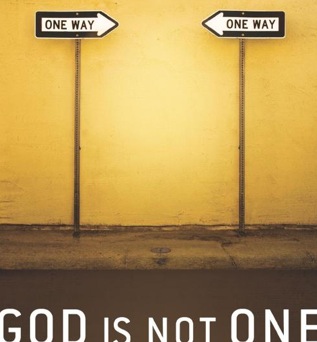 We need to understand other religions for a variety of reasons, not the least of which is our globalized world is making the world smaller and because some think the differences between the religions is actually, upon closer inspection, shrinking as well.
We need to understand other religions for a variety of reasons, not the least of which is our globalized world is making the world smaller and because some think the differences between the religions is actually, upon closer inspection, shrinking as well.
Stephen Prothero agrees with me on the first and on the second claims. The differences must be seen for what they are and not (to coin a bad expression) “pretended into unity.” See Prothero: God Is Not One: The Eight Rival Religions That Run the World–and Why Their Differences Matter
.
.
What are you doing to understand other religions? what can local churches do?
What is your understanding of Islam? Is Islam growing in your community? Are you in dialogue?
In his new book, Prothero offers descriptions of the major religions of the world and does so under the following categories: Problem, solution, technique, exemplar. But, thanks to the skill of Prothero, this is not a systematic book but a gentle walk into the land of each of the faiths. It’s not textbookish. It’s a pleasant read.
His first major chp is about Islam, and he begins there for reasons: “The nineteenth and twentieth centuries may have belonged to Christianity. The twenty-first belongs to Islam.” Why does he say this? Adherents are growing; its influence is growing; its economic assets are growing. Islam, he is saying, is setting the agenda for the 21st Century worldview.
In surveying his survey we run the risk of simplifying too much, so I will make the claim here that I’m highlighting points made in his chapters and not scanning the whole.
1. Most of us in the West know very little about Islam and know very few Muslims. This means we have a hard time being intelligent about Islam and Muslims.
2. Islam is about submission to Allah; it is about a world of peace through that submission.
3. Muslims, devout Muslims, pray 5 times per day, 365 days per year. They face Mecca. At the heart of Muslim faith is a confession that Allah alone is God and that Muhammed is Allah’s prophet.
4. There are five pillars to Islam: the Shahadah, or the creed that I just mentioned in #4; prayer; charity for the needy; fasting; and hajj — or the pilgrimage to Mecca.
5. Jihad is about two kinds of struggle: the struggle against self-sufficiency and pride; the struggle against the “house of war” or the enemies of Islam. The second struggle is found in preaching, teaching, working for justice and war. Here Prothero speaks to an issue that is potentially difficult: but he wants to be honest. Jihad is both spiritual and military (34-35).
6. Allah is God. Allah is one (tawhid). Allah is totally transcendent; no images or pictures. Allah has many names and is not male; the potential threat to Allah is idolatry (shirk).
7. Muhammed is the prophet, and he is to Islam what both Jesus and Paul are to Christianity. So, Prothero says, Muhammed is more in Islam that Jesus is in Christianity. [I’d differ with him here; he goes with the view that Paul is too much the fashioner of Christianity.] Muhammed was everything: leader, prophet, militarist, family man, husband, etc.. Successors to Muhammed created the divisions in Islam.
8. The Quran is to Islam what Jesus is to Christianity. In Arabic, the Quran is to be read in Arabic and translations don’t matter. The sounds are important. It’s about “recitation.” It is not a narrative; it is doctrinal and moral and legal. It emphasizes life after death. Central words in Quran study: recollection, revelation, recitation and remembrance. Some parts seem to suggest Christians and Jews will be in Paradise. Prothero admits there are parts he likes (the holiness, righteousness stuff) and parts he doesn’t like, including stuff about women.
9. Shariah: Shariah “law” is a duplication; the word shariah means the right path of law. It is the legal dimension of Islam. Two major groups: Sunni (majority) and Shia; Sunni decentralize while Shia centralize law and interpretation and religion.
10. Islamism is the radical, political dimension of Islam today: Taliban, Hezbollah, Hamas and al-Qaeda. They want to purify Islam of modernist and Western influences.
11. There are also progressive and moderate Muslims in the world, and some would say the majority are this way.
12. The Sufis are the mystical and more pluralist of Muslims.
